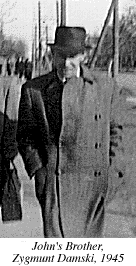 I got out and did the same thing with the next train, and the next, and in this way I made my way as far as Crackow. There I boarded a train in the same manner, but this time a Polish railroad attendant came to check my ticket.
I got out and did the same thing with the next train, and the next, and in this way I made my way as far as Crackow. There I boarded a train in the same manner, but this time a Polish railroad attendant came to check my ticket.
"I just came out of prison," I told him. "I don't have a ticket and I don't have any money."
"Come with me," he said, and he locked me in a compartment. A few miles before Lublin he let me out.
Zamosc: When I finally reached my brother, we talked over our situation. Zygmunt figured it would be easier for us to survive the war in a small, quiet, out of the way place, like Zamosc, about eighty kilometers away. I had never been there, and knew it only from history books. Two weeks later we moved to Zamosc.
Having no money, we needed to find work. The Zamosc unemployment office told me that the Germans were planning to build an airfield nearby. I wasted no time going to their office--it was just across the street. The outfit was a civilian construction company called Bauleitung der Luftwaffe, which means "Building Management for the Airforce," and they were building not one, but six military airfields. In charge of the project was a famous engineer, an energetic man named Walter Enderlein. When he heard me speaking German, he said, "I could use a fellow like you," and so I went to work for him as chief electrician.
"I have to go to Berlin for two weeks," he said to me one day. "When I come back I want you to have fifty electricians working here." Well, I couldn't get fifty electricians because, according to my standards, there were not fifty electricians to be found in that town.
Then I had the idea to look in the Zamosc Jewish forced labor camp. There were at least a couple of hundred Jewish men garrisoned in a former armory. Every morning they went out to dig irrigation ditches for the Germans. A fellow named Walter Reuter from the Bauleitung der Luftwaffe supervised that camp. I went over there and told Reuter what I wanted. He brought all the men out of one of the barracks, and yelled, "Is anyone here an electrician?" Six or seven guys came forward. Only one of them was actually an electrician--a fellow named Friedman. Another one, Feigenbaum, told me his father had a factory that made electrical fixtures; I knew he could not be an electrician. The other guys just wanted to get out. It was October 1940, still near the beginning of their internment, but you could see they were already getting a little bit worn down from their terrible living conditions. I needed a few guys to sort out the materials, so I took them all. It worked out well. In fact, Feigenbaum became my chief assistant, in charge of materials. He was no electrician, but he was very able and intelligent. I liked him.
I found some blankets and fixed up a storage place in a former school for the Jewish men to sleep in--it was more like a compartment than a room. The German construction workers for the airfield were living in the same building. The arrangement worked just fine for two or three months, until one day one of the Germans said to me, "Say, what's going on up there?"
"Those are just the guys who work for me."
"What! Jews under the same roof with me?" He moved them all out in a big hurry. Somehow they found sleeping quarters elsewhere.
My boss, Enderlein, liked me; I became his right hand man. He did not actually belong to the Nazi party, but he was a very strong German nationalist, and he thought Hitler was doing a fine job. He told me many interesting stories that gave me real insight into the thinking of the Nazi leaders. By now it was Easter time '41, and Germany had just invaded Greece. Enderlein asked me to have lunch with him in the hotel.
"Fine," I said. After all, he was my boss.
On the way, he said, "Can you keep your mouth shut?"
"Naturally."
"Did you hear that Germany invaded Greece?"
"Yes, I heard the news this morning."
He rubbed his hands together, "The English are pulverized! It will begin now."
He told me that the Germans were going to fight Russia. Then after they finished off England and Russia, they would take care of the "dirty Italians." At that point they were still allies! How did he even know these things? It seems that just before the war began, Enderlein was the chief engineer at the construction of an airfield in Gleivitz, close to the Polish-German border. When it was completed, Hitler himself came to the dedication and wanted to meet the engineer in charge. In admiration of Enderlein's efficiency, Hitler invited him to come to certain meetings that occurred every two or three months in Berlin. At those meetings Enderlein became privy to all the details of the Nazi's plans. He was no small fry, or a mere dreamer.
"So first we'll take care of the dirty Italians, and then the war begins," he told me.
"With whom?" I asked him.
"With the Yellow Peril."
In 1941 they were already planning a war against Japan! I never read that in a book, but this is the truth; that was what they planned. The day before Germany invaded Russia he told me, "We have one foot in our neighbor's garden now." So I knew they were going to start any minute. Next day, June 22, 1941, the war started.